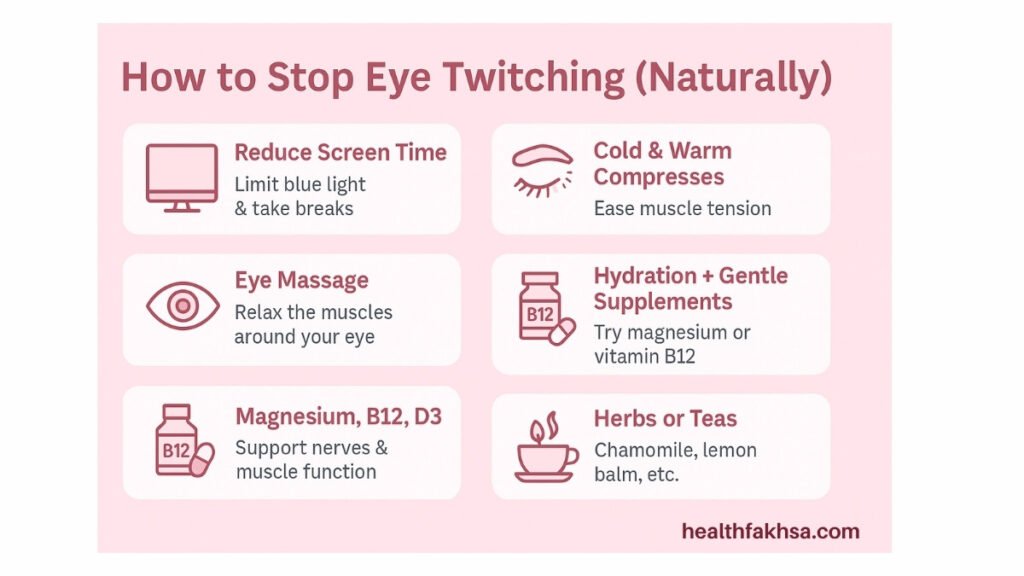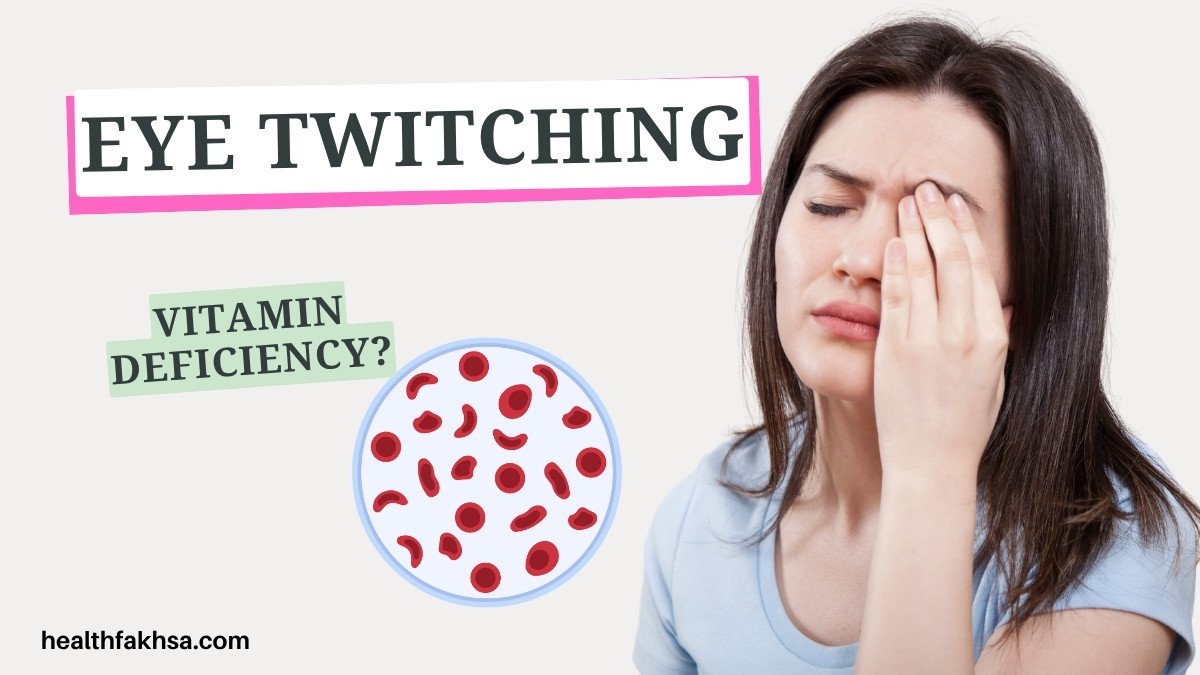Ever had that annoying, fluttering spasm in your eyelid that just won’t quit? You might brush it off as stress, screen strain, or fatigue. But if it keeps happening, it’s time to consider a deeper cause. Often, there’s a connection between eye twitching and vitamin deficiency—particularly in key nutrients like magnesium, B12, and vitamin D. This article explains what your body might be trying to tell you and how to help it heal.
What Is Eye Twitching and Why Does It Happen?
Medical term: Myokymia. It refers to fine, repetitive spasms of the eyelid muscles, typically the lower lid—but occasional twitches can affect the upper lid too.
Common Triggers:
- Fatigue and inadequate rest
- Excessive caffeine or energy drinks
- Stress (mental, emotional)
- Extended screen time or eye strain
- Dehydration or lack of electrolytes
- Dry eye or allergens
For most people, it’s a benign phase. But when those twitching eyelids persist, it signals the possibility of a deeper imbalance, such as a nutrient deficiency.
Eye Twitching Vitamin Deficiency — The Critical Nutrients
1. Magnesium Deficiency and Muscle Spasms
Magnesium supports muscle relaxation and nerve conduction. Low levels can cause frequent twitches, cramps, anxiety, and sleep issues. Inadequate intake—due to caffeine, stress, medications, or poor diet—is often the root cause.
2. Vitamin B12 Deficiency and Nerve Irritation
Essential for nerve health, B12 deficiency may lead to tingling in extremities, persistent twitches, fatigue, and even cognitive changes. Those at risk include vegetarians, older adults, and individuals with absorption issues.
3. Vitamin D and Nervous System Support
Vitamin D regulates nerve firing. A deficiency may not directly cause twitching but can compound muscle and nerve irritation, especially if the other nutrient levels are low.
4. Electrolyte Balance: Potassium & Calcium
Potassium regulates muscle contractions and fluid balance; calcium supports nerve signaling. Low levels of either can exacerbate twitching.
What Causes These Deficiencies?
Understanding why your levels are low helps prevent recurrence.
- Modern Diets – Processed foods and sugary drinks leave little room for nutrient-dense options.
- Restrictive Eating – Diets that exclude key foods may lack these nutrients.
- Gut Issues – Conditions like celiac, IBS, or aging gut lining can hamper absorption.
- Medication Use – Diuretics, acid blockers, and certain antibiotics deplete essential nutrients.
- Alcohol & Caffeine – These stimulants increase nutrient excretion and elevate stress hormone levels.
How to Replenish and Prevent Deficiency
Real Food Fixes:
- Magnesium: Eats like nuts, seeds, spinach, beans, dark chocolate
- B12: Animal-based options like eggs, dairy, meat, or fortified cereals
- Vitamin D: Sunlight, fatty fish, eggs, or vitamin D3 supplement
- Potassium/Calcium: Bananas, avocados, yogurt, leafy greens
Supplement Safeguards:
- Magnesium glycinate/citrate – gentle and effective
- Methylated B12 – better absorbed for those with MTHFR issues
- Vitamin D3 + K2 – to balance bone and nerve health
- Electrolyte blends – without sugar or artificial ingredients
Always check with your doctor before starting supplements—especially if you’re on medications or diagnosed with health conditions.
When Eye Twitching Suggests More Than Deficiency
Persistent twitching might indicate other issues:
- Blepharospasm or Hemifacial Spasm – muscle contractions around your eyes
- Neurological conditions – such as multiple sclerosis or motor nerve issues
- Thyroid problems – can heighten nerve sensitivity
Signs to watch for:
- Ribbon-like contracting around other facial muscles
- Drooping eyelid (“ptosis”) or facial numbness
- Speech or vision difficulties
If symptoms persist beyond two weeks or spread, consult an ophthalmologist or neurologist.
Daily Habits to Calm Twitching
- Drink enough water, including electrolyte-balancing beverages
- Follow the 20-20-20 rule for screen work: every 20 minutes, look 20 feet away for 20 seconds
- Prioritize rest—aim for 7–9 hours of quality sleep
- Limit caffeine intake, especially later in the day
- Use a cool, damp cloth or warm compress on the twitching eye
How to Stop Eye Twitching Fast (Naturally)

Dealing with an irritating eyelid flutter? If eye twitching is leaving you self-conscious or focused on your eyelid, there are fast, natural ways to ease the spasm—without immediately jumping to meds. Read on to discover simple, effective methods that work.
1. Reduce Screen Time
Digital eye strain—especially from phones, computers, or tablets—can trigger twitching. Blue light, glare, and heavy focus make muscles around your eyes tense and twitchy.
Try this:
- The 20-20-20 rule: every 20 minutes, look at something 20 feet away for 20 seconds
- Dim your screen, use anti-glare filters, and take regular breaks
- Wear blue light–blocking glasses if you work long hours on screens
Your eyelids need rest—give them a screen diet to calm the twitch.
2. Use Cold & Warm Compresses
Temperature shifts relax muscles and improve circulation:
- Cold compress: Apply ice wrapped in cloth for 5 minutes to reduce local inflammation
- Warm compress: Follow with a warm cloth (not hot) for 5 minutes to relax twitching muscles
This contrast therapy eases tension and short-circuits the feeling of twitching.
3. Eye Massage Techniques
Gentle massage can reroute muscle signals and ease spasms:
- Clean your fingertips
- Lightly massage the twitching eyelid in tiny circular motions
- Gently massage the brow ridge and temple area
This promotes blood flow and calms overactive muscle fibers.
4. Hydration + Gentle Supplements
Even mild dehydration can trigger spasms. Pair water with natural support:
- Hydration: Aim for 8 cups of water daily, or more if you’re active
- Gentle magnesium supplement: Try magnesium glycinate (200–300 mg at bedtime)
- Calming tea: Sip chamomile or lemon balm tea in the evening to pause stress signals
These steps often end a twitching cycle in 24–48 hours.
Supplements to Consider for Eye Twitching
If twitching persists, targeted vitamins might provide longer-term relief—especially when related to eye twitching vitamin deficiency.
• Magnesium Citrate or Glycinate
Magnesium is critical for muscle relaxation. Look for forms that absorb well and taste light:
- Glycinate: gentle on the stomach
- Citrate: mild laxative effect, but highly bioavailable
Start with 100–200 mg daily and adjust based on how your body responds.
• Methylated B12 vs. Cyanocobalamin
If low B12 is causing twitching:
- Methyl-B12 is more easily used in your body—ideal if absorption is a concern
- Cyanocobalamin is standard and effective if your digestion works well
Daily dosage should range from 500 mcg to 1,000 mcg—or per your doctor’s advice.
• Vitamin D3 and Cofactors
Low vitamin D affects nerve sensitivity. A daily dose of 1,000–2,000 IU works, ideally paired with vitamin K2 and magnesium for best absorption.
• Natural Sources vs. Pills
Whole-food supplements often come with supportive minerals. However, pills provide consistency and dosage control if you’re correcting a deficiency. A combination can work best, overseen by your healthcare provider.
Can Herbs or Teas Help With Eye Twitching?
Nature offers subtle but powerful tools. Certain herbs can relax nerves and reduce stress:
- Chamomile: mild anti-inflammatory and relaxing
- Lemon balm: soothes nerve tension
- Magnesium-enhanced tea: combines hydration with muscle support
You can also try adaptogens like:
- Ashwagandha: balances cortisol and calms the nervous system
- Holy basil: supports stress resilience
These work best alongside good sleep, nutrition, and hydration habits.
Eye Twitching During Stress or PMS — Is It Still a Vitamin Issue?
Time-of-month twitches? Hormones can trigger or worsen twitching—but vitamins still make a difference.
Hormones That Shift Nerve Behavior
During PMS:
- Estrogen drops: this affects serotonin and nerve excitability
- Magnesium levels fall: your body uses more during hormonal shifts
This combo can spike twitching—especially if you’re already low on key vitamins.
What to Do If It’s Cyclical
- Take a preventative magnesium dose (200 mg at night) in the week before your period
- Maintain balanced blood sugar through small meals and snacks
- Keep stress low with gentle yoga or meditation
- Monitor if twitching consistently starts with your cycle—tracking helps your doctor guide you
Hormonal cycling doesn’t eliminate nutritional solutions—it highlights their importance.
FAQs — Eye Twitching & Vitamin Deficiency
Q1: What vitamin deficiency causes eye twitching?
Magnesium and vitamin B12 deficiencies are most often linked to twitching, followed by low vitamin D. These nutrients support muscle and nerve function.
Q2: Can low B12 cause eye twitching?
Yes. Vitamin B12 supports nerves. Deficiency can lead to twitching, tingling, or numbness—even without other obvious symptoms.
Q3: Is magnesium good for eye twitching?
Absolutely. Magnesium helps nerves and muscles relax. Low intake often shows first in twitching or cramps.
Q4: How do I know if my twitch is due to vitamin deficiency or stress?
If rest, hydration, and stress relief don’t stop the twitch after a few days, getting bloodwork can identify deficiencies. Stress-related twitches tend to ease quickly with relaxation, while nutritional ones linger.
Q5: Can I stop eye twitching with food alone?
Sometimes. A balanced diet high in magnesium, B12, and vitamin D can prevent mild symptoms. However, slower absorption may delay improvement. Supplements offer a precise boost when levels are low.
Bottom Line — Empower Your Eyelids
Eye twitching can be a nuisance—but it is not just a random quirk. Often, it’s a subtle shout from your nervous system hinting at eye twitching vitamin deficiency or stress overload.
You can stop it fast with hydration, compresses, and eye massages. You can stop it long-term by restoring key nutrients, reducing screen strain, and lowering stress—especially during PMS weeks.
You deserve calm eyes and calm days. Your body is smart. Listen, support it, and it often rewards back with much-needed peace.

